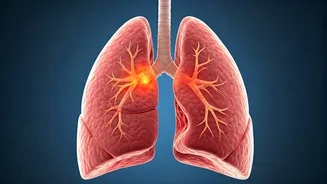Cough: More Than Annoyance
A cough, often dismissed as a minor inconvenience, can sometimes signal a more serious underlying health issue. While most coughs are caused by common
colds or other mild infections, some coughs might be indicative of a deeper problem like pneumonia, a lung infection that can become severe if left untreated. Pneumonia inflames the air sacs in one or both lungs, which can fill with fluid or pus, causing symptoms like fever, chills, and difficulty breathing. When assessing a cough, it is important to observe its characteristics: the frequency, the presence of any accompanying symptoms, and the overall duration. A cough accompanied by fever, chest pain, or shortness of breath should be assessed quickly by a healthcare professional. Understanding these nuances helps differentiate between a regular cough and one that demands immediate medical intervention.
Spotting Pneumonia Symptoms
Recognizing the symptoms of pneumonia is a critical step in ensuring timely medical care. The signs of pneumonia can vary, but common indicators include a cough that produces mucus, which can be green, yellow, or even bloody, and is frequently accompanied by a high fever, accompanied by chills and sweats. Chest pain, particularly when breathing deeply or coughing, is a key symptom. Other signs might include shortness of breath, rapid breathing, and fatigue. The severity of these symptoms can depend on the type of pneumonia, the patient’s age, and their overall health. Recognizing these symptoms and acting swiftly is essential for a quicker recovery, as early treatment with antibiotics can often resolve bacterial pneumonia. If you experience these symptoms, especially if you also have underlying health conditions or are an elderly person, seek medical advice promptly.
When to Seek Help?
Determining when to seek medical attention for a cough is crucial in preventing complications. If a cough is accompanied by high fever (above 100.4°F or 38°C), persistent chest pain, difficulty breathing, or the production of discolored mucus, it is a clear indication to consult a doctor. Other warning signs include confusion or changes in mental state, especially in the elderly. Anyone with underlying health conditions, such as asthma, COPD, or a weakened immune system, is at a higher risk of developing severe pneumonia and should seek immediate medical care when they notice these symptoms. Furthermore, if a cough lasts for more than a few weeks without improvement, consulting a healthcare professional is advisable to rule out any underlying causes. Timely medical evaluation is critical for correct diagnosis and treatment.
Prevention Strategies: Safeguarding Lungs
Preventative measures play a significant role in reducing the risk of pneumonia. One of the most effective strategies is vaccination. The pneumococcal vaccine, for example, protects against the most common bacteria that cause pneumonia and is recommended for children, the elderly, and individuals with chronic health conditions. Moreover, practicing good hygiene, such as frequent handwashing, is critical in preventing the spread of respiratory infections that can lead to pneumonia. Avoiding close contact with sick individuals and maintaining a healthy lifestyle, with a balanced diet, regular exercise, and adequate sleep, also boost the immune system and make the body more resilient to infections. Additionally, quitting smoking and avoiding exposure to pollutants can safeguard the lungs and lessen the likelihood of respiratory infections. Incorporating these measures into daily life helps maintain good lung health.
Diagnostic Processes Explained
If you suspect pneumonia, the diagnostic process usually begins with a thorough medical history and physical examination. A doctor will typically listen to your lungs with a stethoscope to check for abnormal sounds, such as crackling or wheezing, which could suggest fluid or inflammation. Further diagnostic tests may include a chest X-ray to visually confirm the presence of pneumonia and assess the extent of the infection in the lungs. Blood tests might be ordered to check for signs of infection and to identify the specific pathogens causing the illness. In some cases, sputum tests might be performed to analyze mucus from the lungs and to pinpoint the causative bacteria or virus. Early diagnosis enables the physician to prescribe appropriate treatment and prevent the condition from getting more severe. These tests enable doctors to provide the most effective treatment.
Treatment: How Pneumonia Treated
The treatment for pneumonia depends on the type and severity of the infection. Bacterial pneumonia is typically treated with antibiotics, and it’s critical to finish the complete course of the medication as prescribed by the doctor. For viral pneumonia, antiviral medications might be prescribed in specific situations, depending on the causative virus. Additional treatments often involve rest, plenty of fluids, and medications to help manage symptoms such as fever and cough. In more severe cases, hospitalization might be required, especially if there is difficulty breathing, low oxygen levels, or other complications. During the recovery period, it is important to follow the doctor’s recommendations, get adequate rest, and avoid activities that can further strain the lungs. Taking these measures will help improve the body's natural defense mechanism, which is important for fast recovery.





















